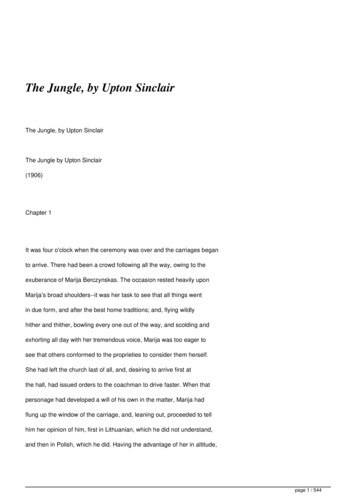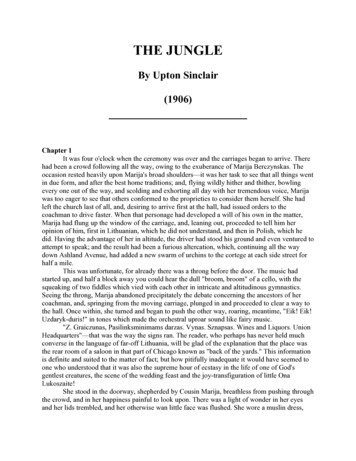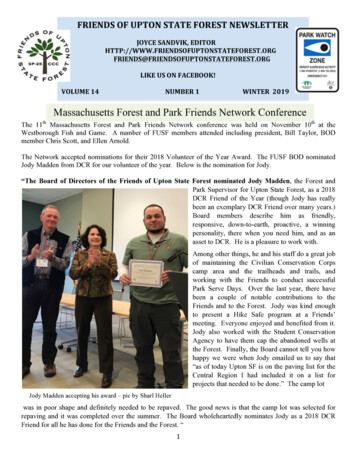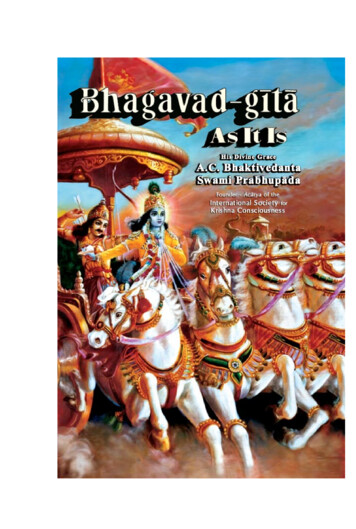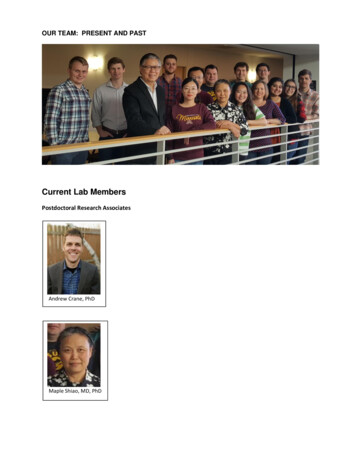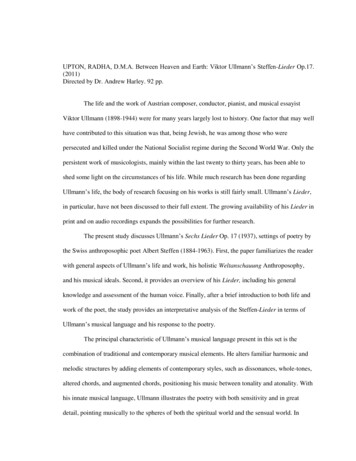
Transcription
UPTON, RADHA, D.M.A. Between Heaven and Earth: Viktor Ullmann‟s Steffen-Lieder Op.17.(2011)Directed by Dr. Andrew Harley. 92 pp.The life and the work of Austrian composer, conductor, pianist, and musical essayistViktor Ullmann (1898-1944) were for many years largely lost to history. One factor that may wellhave contributed to this situation was that, being Jewish, he was among those who werepersecuted and killed under the National Socialist regime during the Second World War. Only thepersistent work of musicologists, mainly within the last twenty to thirty years, has been able toshed some light on the circumstances of his life. While much research has been done regardingUllmann‟s life, the body of research focusing on his works is still fairly small. Ullmann‟s Lieder,in particular, have not been discussed to their full extent. The growing availability of his Lieder inprint and on audio recordings expands the possibilities for further research.The present study discusses Ullmann‟s Sechs Lieder Op. 17 (1937), settings of poetry bythe Swiss anthroposophic poet Albert Steffen (1884-1963). First, the paper familiarizes the readerwith general aspects of Ullmann‟s life and work, his holistic Weltanschauung Anthroposophy,and his musical ideals. Second, it provides an overview of his Lieder, including his generalknowledge and assessment of the human voice. Finally, after a brief introduction to both life andwork of the poet, the study provides an interpretative analysis of the Steffen-Lieder in terms ofUllmann‟s musical language and his response to the poetry.The principal characteristic of Ullmann‟s musical language present in this set is thecombination of traditional and contemporary musical elements. He alters familiar harmonic andmelodic structures by adding elements of contemporary styles, such as dissonances, whole-tones,altered chords, and augmented chords, positioning his music between tonality and atonality. Withhis innate musical language, Ullmann illustrates the poetry with both sensitivity and in greatdetail, pointing musically to the spheres of both the spiritual world and the sensual world. In
doing so, his aim was perhaps to represent the primary tension between the darkness of earthlylife and the hope for spiritual redemption in heaven as they are expressed in Steffen‟s poetry.
BETWEEN HEAVEN AND EARTH: VIKTOR ULLMANN‟SSTEFFEN-LIEDER OP. 17byRadha UptonA Dissertation Submitted tothe Faculty of The Graduate School atThe University of North Carolina at Greensboroin Partial Fulfillmentof the Requirements for the DegreeDoctor of Musical ArtsGreensboro2011Approved byCommittee Chair
2011 Radha Upton
To my motherii
APPROVAL PAGEThis dissertation has been approved by the following committee of the Faculty of TheGraduate School at The University of North Carolina at Greensboro.Committee ChairCommittee MembersDate of Acceptance by CommitteeDate of Final Oral Examinationiii
ACKNOWLEDGEMENTSI would like to thank to thank the members of my Doctoral Advisory Committee, Dr.James Douglass, Dr. Kelly Burke, and Dr. Donald Hodges for their time and continuous supportthroughout my studies. In particular, I thank the chair of my committee, Dr. Andrew Harley,whose detailed comments, and comprehensive advice were most helpful in this project. Hisinspiration and his dedication to the artistic “high road” will be my guide for many years to come.I would like to thank European American Music Distributors LLC, sole U.S. andCanadian agent for Schott Music GmbH & Co. KG for their kind permission to use selectedexamples from their publication “Ullmann SÄMTLICHE LIEDER” within this document.I thank soprano Julie Celona-VanGorden for her engagement and enthusiasm during theprocess of studying these songs. Our discussions furthered my understanding of the music to agreat extent. I also thank my sister-in-law, Jeanette Mendell, for her warm interest and supportwhile proof-reading my document.Finally, I am most grateful to my husband, David Upton, whose love, patience, andencouragement carried me not only during this project, but also throughout my studies. Life afterthe dissertation looks very inviting.iv
TABLE OF CONTENTSPageLIST OF FIGURES . viCHAPTERI.INTRODUCTION . 1II.VIKTOR ULLMANN . 7Biography . 7Ullmann and Anthroposophy . 14Musical Ideals and Language . 21III.ULLMANN‟S LIEDER: AN OVERVIEW . 25Works . 25Vocal Perspectives . 28IV.SECHS LIEDER NACH GEDICHTENVON ALBERT STEFFEN, OP.17 . 32Albert Steffen . 32Sechs Lieder nach Gedichtenvon Albert Steffen, Op.17 . 36An Himmelfahrt . 39Drei Blumen . 46Dreierlei Schutzgeister . 51Es schleppt mein Schuh . 57Wie ist die Nacht . 61Aus dem Häuschen in den Garten . 68V.CONCLUSION . 75BIBLIOGRAPHY . 78APPENDIX A: POEMS AND TRANSLATIONS . 82v
LIST OF FIGURESPageFigure 1. An Himmelfahrt, mm. 1-11. . 40Figure 2. An Himmelfahrt, mm. 12-15. . 41Figure 3. An Himmelfahrt, mm. 20-23. . 42Figure 4. An Himmelfahrt, mm. 32-43. . 44Figure 5. An Himmelfahrt, mm. 44-49. . 45Figure 6. Drei Blumen, mm. 1-4. . 46Figure 7. Drei Blumen, mm. 34-36. . 50Figure 8. Dreierlei Schutzgeister, mm. 1-10. . 52Figure 9. Dreierlei Schutzgeister, mm. 15-18. . 53Figure 10. Dreierlei Schutzgeister, mm. 27-36. . 55Figure 11. Dreierlei Schutzgeister, mm. 37-46. . 56Figure 12. Es schleppt mein Schuh, mm. 1-3. . 58Figure 13. Es schleppt mein Schuh, mm. 10-12. . 59Figure 14. Es schleppt mein Schuh, mm. 13-15. . 60Figure 15. Wie ist die Nacht, mm. 1-4. . 62Figure 16. Wie ist die Nacht, mm. 34-41. . 66Figure 17. Wie ist die Nacht, mm. 54-57. . 68Figure 18. Aus dem Häuschen in den Garten, mm. 1-8. . 70Figure 19. Aus dem Häuschen in den Garten, mm. 9-11. . 72Figure 20. Aus dem Häuschen in den Garten, mm. 26-29. . 74vi
CHAPTER IINTRODUCTIONThe life and the work of Austrian composer, conductor, pianist, and musical essayistViktor Ullmann (1898-1944) were for many years largely lost to history. One factor that may wellhave contributed to this situation was that, being Jewish, he was among those who werepersecuted and killed under the National Socialist regime during the Second World War. Not onlywas his life taken, but his existence was almost entirely obliterated through the destruction of hispersonal belongings, including letters, articles, manuscripts and works. Only the persistent workof musicologists, mainly within the last twenty to thirty years, has been able to finally shed somelight on the general circumstances of Ullmann‟s life.1 A collection of Ullmann-letters from theyears 1917-1919, which was donated to the institution musica reanimata in 1998, wasparticularly illuminating in giving those general circumstances personal depth, providing insightinto the young Ullmann‟s inner life, thoughts and aspirations.2While much research has been done regarding Ullmann‟s life, the body of researchfocusing on his works is still fairly small. Ullmann‟s Lieder, in particular, have not beendiscussed to their full extent with only one dissertation by Wendy Anne Mullen on the Geistliche1Ingo Schulz, Viktor Ullmann: Leben und Werk (Kassel: Bärenreiter, 2008), 9-10.2Ingo Schultz, “Viktor Ullmann und Arnold Schönberg: Dokumente aus den Jahren 1917-1919,” inArnold Schönbergs Wiener Kreis, Bericht zum Symposium 12.-15. September 1999, ed. Christian Meyer(Vienna: Arnold Schönberg Center, 2000), 160-161. The institution musica reanimata: Förderverein zurWiederentdeckung NS-verfolgter Komponisten und ihrer Werke e.V. was founded in Berlin, Germany, in1990 to help rediscover composers persecuted during the Third Reich. Concerts, conferences, a bookseries, and a journal deliver the findings to the public. musica reanimata, admin. Peter Sarkar, websitehttp://www.musica-reanimata.de/ (accessed Jan 18, 2011).1
Lieder Op. 20, and an article by Gottfried Eberle on the Hölderlin Lieder. Most research onUllmann, primarily written in German, focuses on his biography, his piano solo works, and aboveall his Theresienstadt opera, Der Kaiser von Atlantis (The Emperor of Atlantis). Ingo Schultz haswritten extensively on Ullmann, publishing several articles on aspects of Ullmann‟s life, hisconnection to Arnold Schönberg (1874-1951) and Alban Berg (1885-1835), and a collection ofcritiques Ullmann wrote on concerts in Theresienstadt. Most recently, he published the Ullmannbiography Viktor Ullmann: Leben und Werk (Bärenreiter: Kassel, 2008). Additional worksinclude another comprehensive biography by Verena Naegele, a description of the generalcircumstances in Theresienstadt by Hans Günther Adler in which Ullmann‟s activities arementioned in several places, and a catalogue of Ullmann‟s works by Hans-Günter Klein. Severaljournal articles focus on specific works, such as the piano sonatas and the opera, Der Kaiser vonAtlantis. In English, there are currently only three dissertations on some of Ullmann‟s works, aswell as a biographical sketch by Max Bloch, a former student of Ullmann‟s.Vocal music held an important place within Ullmann‟s musical output, although he wrotein almost all genres: orchestral music, solo instrumental and chamber music, vocal solo andchoral music, and opera. He composed Lieder throughout his whole career: songs were among hisearliest compositions, and he continued to write Lieder in Theresienstadt.3 While the early songsfrom the 1920s are lost, songs from the later years provide insight into his compositional goals,values and principles.In contrast to many of his contemporaries, Ullmann never had a publisher during hislifetime. Many of his early works are therefore lost, and we only know of them through press3Ingo Schultz, Leben und Werk, 260-262.2
reports of the time.4 In the mid 1930s however, he began publishing some of his own works, andthanks to this and to several friends keeping his music while he was in Theresienstadt and later inAuschwitz, many of his later works survived.5To date, a substantial body of Ullmann‟s Lieder has been found and preserved. In 2004,Schott published a complete volume of Ullmann‟s songs, including an extensive foreword with abrief historical setting of the individual songs and cycles, and editorial notes.6 Several recordingsof Ullmann‟s Lieder include Lieder for voice and piano with Christine Schäfer (soprano), AxelBauni (piano), Yaron Windmüller (baritone), and Liat Himmelheber (mezzo-soprano).7 MitsukoShirai (soprano), Elisabeth Verhoeven (mezzo-soprano), and Hartmut Höll (piano), also recordeda selection of Ullmann‟s Lieder for voice and piano.8 Petr Matuszek (baritone), Aleš Kañka(piano), Pavel Eret (violin), Libor Kañka (viola), and Vladan Koči (violoncello) includedadditionally some Lieder for voice and string trio.9 Other recordings include Ullmann‟s Lieder incollections of Holocaust composers. In spite of the favorable situation regarding general researchand availability of scores and recordings, Ullmann remains relatively unknown. His Lieder are4Schultz, Leben und Werk, 88.5Hans-Günter Klein, ed. Viktor Ullmann-Materialien, Verdrängte Musik, vol. 2 (Hamburg: VonBockel, 1995), 11-13.6Viktor Ullmann, Complete Songs for Voice and Piano (Mainz: Schott, 2004).7Viktor Ullmann, Lieder, Christiane Schäfer, Liat Himmelheber, Yaron Windmüller, and Axel Bauni(Orfeo, 1995).8Viktor Ullmann, Die Weise von Liebe und Tod des Cornets Christoph Rilke, Hölderlin Gesänge,Liebeslieder, Mitsuko Shirai, Elisabeth Verhoeven, and Hartmut Höll (Capriccio, 2002).9Viktor Ullmann, Songs, Petr Matuszek, Aleš Kañka, Pavel Eret, Libor Kañka, and Vladan Koči(Supraphone, 1997).3
not yet performed with any degree of frequency on the concert stage, thus providing a richopportunity for research.Ullmann, in addition to composition, was also active as a writer of articles for severaljournals of his time, such as Der Auftakt, Anbruch, and Das Goetheanum.10 His articles lay outhis ideas on various musical topics, such as composers, musical life at the time, and vocal music.As evident from his writings, Ullmann attempted to unite elements from different eras in hismusical language, rather than being a disciple of one particular school of composition. His aim asa composer was to find his own path between music from the past and music from the present.In the present study, I discuss Ullmann‟s Sechs Lieder Op. 17 (1937), settings of poetryby the Swiss anthroposophic poet Albert Steffen (1884-1963). The principal characteristic ofUllmann‟s musical language present in this set is the combination of traditional and contemporarymusical elements. He repeatedly alters familiar harmonic and melodic structures by addingelements of contemporary styles, such as dissonances, whole-tones, altered chords, andaugmented chords, positioning his music between tonality and atonality. Ullmann‟s innatemusical language illustrates the poetry with both sensitivity and in great detail, pointing musicallyto the spheres of both the spiritual world and the sensual world. Thus, his aim was perhaps torepresent the primary tension between the darkness of earthly life and the hope for spiritualredemption in heaven as they are expressed in Steffen‟s poetry.This paper consists of five chapters. After the introductory first chapter, the secondchapter is divided into three sections, familiarizing the reader with general aspects of Ullmann‟slife and work. The first section focuses on the major periods of his life, intertwined with hismusical development as composer. The second section describes Ullmann‟s path to10See the list of Ullmann’s articles in the bibliography section of this paper.4
Anthroposophy, a holistic, Christian-based Weltanschauung (world view) which, following theteachings of the Austrian Rudolf Steiner (1861-1925), aims at a more insightful understanding ofthe world. The third section discusses Ullmann‟s musical ideals, as shaped by his own musicalexperiences, and as expressed in his literary writings and music.The third chapter gives an overview of Ullmann‟s Lieder, including poets, topics andmajor musical characteristics. His poetry selections include old and new, German and foreign,familiar and unfamiliar poets, thereby demonstrating his somewhat eclectic taste and interest. Thesecond section of this chapter addresses Ullmann‟s general knowledge and assessment of thehuman voice in terms of both its technical and musical capabilities.The fourth chapter is an examination of the Steffen-Lieder. A biographical introductionto the poet precedes a short interpretation of his poems and the discussion of the songs. Theinterpretative analysis makes use of various techniques as deemed appropriate and necessary toobtain an in-depth understanding of the structure and character of the music and its relationship tothe text.With the exception of the third song, the Steffen-Lieder have a quiet character with bothmusic and poetry avoiding extremes and the vocal and piano parts often very close in range if notdoubled. Poetic struggles remain introverted in the music, emanating an overall sense of calmnessand peacefulness, reflecting the anthroposophical ideal of the reassurance of salvation in death.The sixth and final chapter summarizes the findings. Ullmann‟s Steffen-Lieder showprincipal characteristics of his musical language, as well as his sensitive response to theanthroposophic poetry. In general, he used more traditional elements to illustrate the familiar,such as the earthly life with its burdens and sufferings. In contrast, Ullmann utilized morecontemporary elements to depict the unfamiliar, such as the elements of death, reincarnation, andthe afterlife. Hence, Ullmann musically demonstrates the connection and intertwinement of earth5
and heaven, life and death, familiar and unfamiliar, all of which are present in Steffen‟santhroposophical poetry.6
CHAPTER IIVIKTOR ULLMANNBiographyViktor Ullmann was born in 1898 in Teschen, a small city in the Austro-HungarianEmpire before the First World War, divided since between the Czech Republic and Poland. Hisfather, Maximilian Georg Ullmann (1861-1938), was a soldier; his mother, Malwine MarieUllmann (born Bilitzer, 1873-1940), belonged to the Vienna high bourgeoisie. Ullmann was apupil in the Volksschule (1904-1908) and of the Albrecht-Gymnasium (1908-1909) in Teschenuntil he moved with his mother to Vienna, where he became a student at the RasumofskyGymnasium.11 He graduated from there in 1916 with a Kriegsabitur, the certification ofcompletion of requirements without examination, in order to enlist in the army for active service.Ullmann was awarded a Tapferkeitsmedaille (medal for courage) for his service during the warand a promotion to Second Lieutenant in 1918.12 After the war he moved to Prague, which washis home from 1919-1942 with the exception of his attempts to find work in Aussig, Zurich andStuttgart.Throughout his life, Ullmann searched for spiritual fulfillment. Originally baptizedCatholic, he later converted to Protestantism and was also interested in Eastern religions and11Schultz, Leben und Werk, 13-22; Ingo Schultz, “Wege und Irrwege der Ullmann-Forschung”, inViktor Ullmann: Die Referate anlässlich des 50. Todestages, 14.-16. Oktober 1994 in Dornach, undergänzende Studien, ed. Hans-Günter Klein (Hamburg: Von Bockel, 1996), 14.12Schultz, Leben und Werk, 37.7
Anthroposophy, which will be discussed in more detail later in this study. However, both hisparents were originally Jewish,13 a fact which ultimately resulted in profound consequences oncethe National Socialists came to power in Europe. In 1942, Ullmann was deported to the NationalSocialist concentration camp Theresienstadt, and he was killed in Auschwitz in 1944.Ullmann‟s early musical education is only sparsely documented, but as Schultz andothers have established, among his first musical experiences were the music of the CatholicChurch and military music, Teschen being a garrison city. From 1914 until 1916, he receivedinstruction in music theory from Dr. Josef Polnauer (1888-1969) and, particularly after the FirstWorld War, in piano with Eduard Steuermann (1892-1964), both students of Schönberg.14 Afterthe war, Ullmann participated in Schönberg„s composition seminar near Vienna, studyingcounterpoint and harmony with him (September 1918 - April 1919).15 This experiencestrengthened his wish to pursue music as a career and led to his resignation from law studies hehad begun at the University of Vienna in order to please his father. After his move to Prague,Ullmann studied composition privately with Heinrich Jalowetz (1882-1946), and in 1935 beganstudies in quarter-tone music with Alois Hába (1893-1973) at the conservatory in Prague.16 Ingeneral however, Ullmann was a musical autodidact, learning by self-study from the repertoire ofhis past and present.1713Both Ullmann’s parents came from Jewish families, but converted to Catholicism together in1896, in order to improve Maximilian’s career chances, and to fit better into society. Schultz, Leben undWerk, 9-10.14Schultz, Leben und Werk, 26.15Ibid., 75; Naegele additionally lists form, instrumentation, and analysis, in: Verena Naegele,Viktor Ullmann: Komponieren in Verlorener Zeit (Köln: Dittrich, 2002), 99.16Schultz, Leben und Werk, 157.17Ibid.,70.8
As a young pupil, Ullmann experienced the rich cultural and musical scene of Vienna atthe turn of the century with all the changes and developments in music at the time. ThePhilharmonic, the Hofoper, the Musikverein and the Konzerthaus, to name only a few, providedmany opportunities to hear standard repertoire as well as new compositions by composers such asGustav Mahler (1860-1911), Richard Strauss (1864-1949) and Schönberg.While in preparation for his military service, and also while at the front, Ullmann showedcontinued interest in the cultural and particularly the musical scene of Vienna. He studied worksby Schönberg, Mahler and Strauss, as well as Johann Sebastian Bach (1684-1750), WolfgangAmadeus Mozart (1756-1791) and Claude Debussy (1862-1918).Ullmann also kept his knowledge of poetry current through his exposure to contemporaryliterary journals, particularly the expressionist journal, Die Fackel (The Torch). Editor Karl Kraus(1874-1936) published his own works, critiquing language, society, and war, as well as works byother authors of similar ideology. In addition to Kraus‟ writings, some of the authors Ullmannread in Die Fackel included Else Lasker-Schüler (1869-1945) and Georg Trakl (1887-1914), whoalso belonged to the literary movement of Expressionism.18 Ullmann‟s early musical settings oftheir poems are today, unfortunately, all assumed lost.After the war and after completing several months of Schönberg‟s seminars, Ullmannmoved to Prague in May 1919. In the following year, he became first choir director, coach andlater also Kapellmeister at the Prager Neudeutsches Theater under Alexander Zemlinsky (18711942). One of his first tasks at the theater was the preparation of the chorus for a performance ofSchönberg‟s Gurrelieder, which he fulfilled with much acclaim.1918Schultz, Leben und Werk, 46.19Ibid., 84.9
In addition to his work at the theater, Ullmann wrote articles for the new music journalDer Auftakt (The Upbeat) on various music historical and music sociological issues, and hecomposed.20 Among his earliest works are his Sieben Lieder mit Klavier (1923), the first stringquartet (1923), his Symphonische Phantasie (1924) and the first version of his Variationen undDoppelfuge über ein kleines Klavierstück von Schönberg (1925), all of which received successfulpremieres in Prague and helped Ullmann to establish himself as a composer.21In the summer of 1927, when Zemlinsky left Prague following an invitation to the KrollOper in Berlin, Ullmann accepted the position of musical director at the opera in Aussig, on theborder between Czechoslovakia and Germany.22 In his first leading position he was responsiblefor a complete opera season from planning stages to performances. In spite of his success inAussig, documented in several press reports, he resigned after only one season to return toPrague, perhaps because he wanted to shift his work balance from conducting to composition.23Now without formal employment, Ullmann combined composing, teaching,accompanying and writing to provide for himself and his wife. In fact, his theoreticalpresentations of various musical matters won great acclaim and remained one of his mainoccupations into the Theresienstadt years. Increasing numbers of performances of his works,particularly the performance of the second version of his Schönberg-Variationen at theInternationale Tage Neuer Musik (World New Music Days) in Geneva in 1929, helped to build20Der Auftakt, edited by Erich Steinhard (1886-1941: date of last deportation to theconcentration camp of Łódź, date of death unknown), published detailed commentary and observationsregarding the musical developments in Prague and the Czechoslovakian Republic between the two WorldWars; Schultz, Leben und Werk, 82, 240.21Ibid., 102.22Ibid.23Ibid., 106.10
Ullmann‟s reputation as composer.24 However, still without a publisher and without a reliableincome, Ullmann moved to Zurich in the summer of 1929 to become Kapellmeister at theSchauspielhaus (1929-1931) in an attempt to find a financially more consistent position.However, his work with the stage band often required arrangements and the composition ofincidental music for the individual theatrical pieces, and it did not prove satisfactory long term.He moved back to Prague in the summer of 1931.While in Zurich, Ullmann came in direct contact with Anthroposophy, a Weltanschauungwhich became very important for him. He became a member of the Anthroposophical Society inthe summer of 1931, shortly after his return to Prague. His interest and engagement foranthroposophical ideals went so far that, in lieu of a formal musical break-through, he moved toStuttgart as the owner of an anthroposophical bookstore. However, with little to no experience inbookkeeping and accounting, and unaware of the disastrous financial situation of the bookstore atthe time of purchase, the attempt proved catastrophic for Ullmann. In the summer of 1933, afterlosing all his financial assets, he fled back to Prague, which then remained his home until hisdeportation to Theresienstadt.Struggling once again to find a reliable position,25 he entered a particularly creativeperiod as a composer with many new works and their performances, public presentations (alsobroadcast on radio), and articles in various newspapers and journals. Twice, he received the EmilHertzka-Preis (Emil-Hertzka-award): 1934 for the third version of his Schönberg- Variationen,24Ibid., 108-110.25In addition to his earlier difficulties, Ullmann’s choice of Austrian citizenship in 1921 proveddisadvantageous when, as a foreigner, he faced even more difficulties in his search for employment. Inspite of his many attempts, the Czech ministries refused to grant him Czech citizenship. Schultz, Leben undWerk, 137- 138, 167.11
and 1936 for his opera Der Sturz des Antichrist (The Fall of the Antichrist), based on a drama bySteffen.In the summer of 1937 however, Ullmann suffered a severe physical and mentalbreakdown requiring psychiatric treatment. After the third, partially successful clinical attempt oftreatment, Ullmann declared himself fully recovered in May 1938. During this time, Ullmannwrote a diary in verse titled Ein fremder Passagier ((The Foreign Traveler), in which hefrequently used specific anthroposophical symbolism, perhaps helping him to deal with personalissues at the time.26Although he had already begun to publish his works himself in 1936, it was Ullmann‟sinheritance after the death of his father in 1938 that allowed him financially to continue to doso.27 He was very selective and self-critical while choosing the pieces to be published, decidingagainst many of his earlier works.28Due to the political developments in Europe, particularly the beginning of the Germanoccupation of Czechoslovakia in 1939, life became more and more difficult for Ullmann,especially in light of the fact that he was Jewish. His already limited opportunities to present hisworks to the public were even further restricted until they came to a complete halt by the end of1941.29 Finally, all attempts to immigrate having failed, he was deported to the concentration26Ibid., 170. Some uncertainty exists regarding the exact time of Ullmann’s writing of Der FremdePassagier: Vlasta Benetková assumes with the years 1933-1936 an earlier date than Schultz; VlastaBenetková, “Viktor Ullmanns ‘Tagebuch’, sein
UPTON, RADHA, D.M.A. Between Heaven and Earth: Viktor Ullmann‟s Steffen-Lieder Op.17. (2011) Directed by Dr. Andrew Harley. 92 pp. The life and the work of Austrian composer, conductor, pianist, and musical essayist Viktor Ullmann (1898-1944) were for many years largely lost to history. One factor that may well
